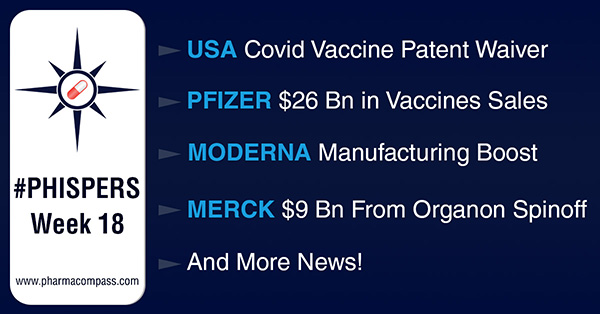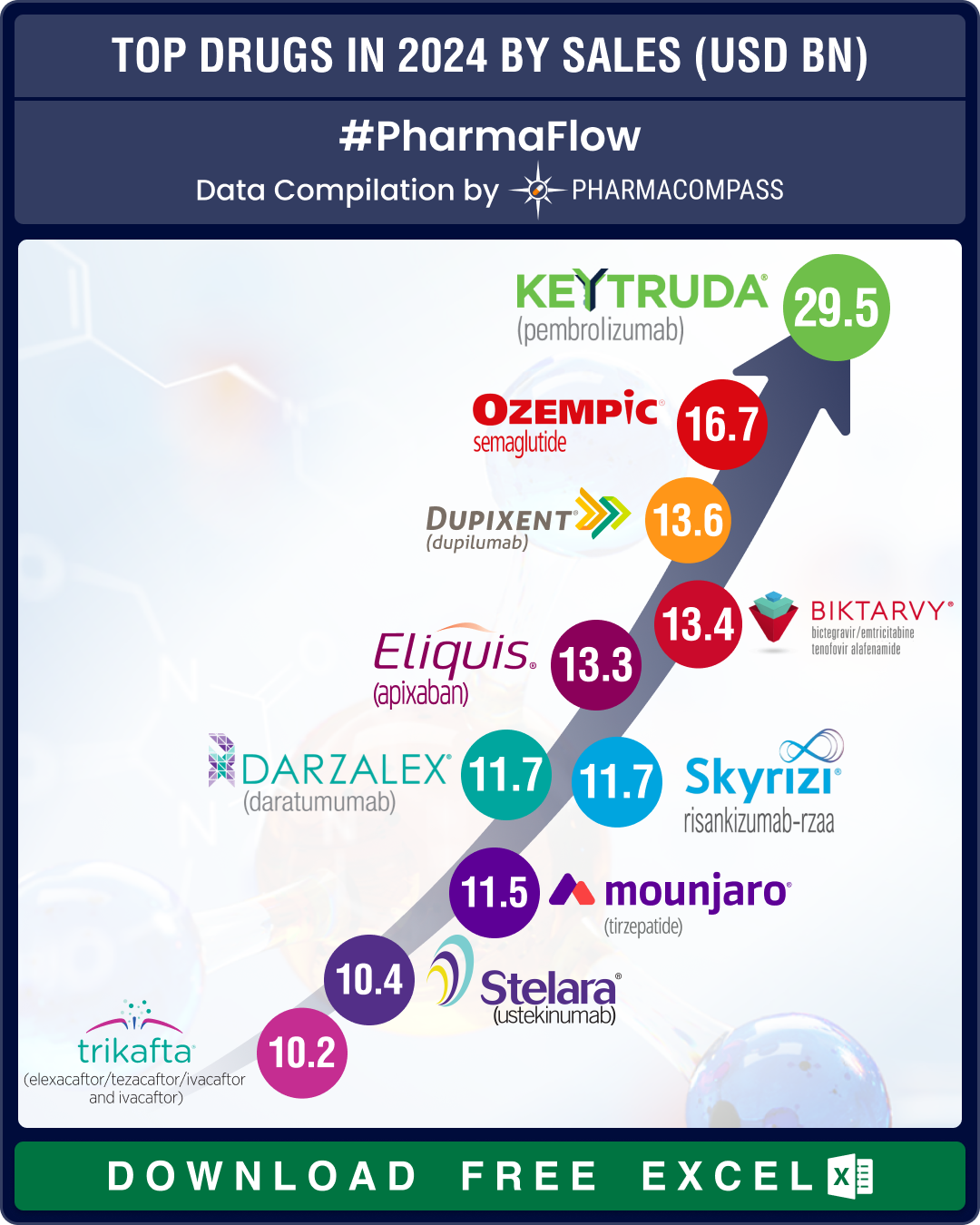
By PharmaCompass
2021-05-06
Impressions: 2057
This week, Phispers brings you news on the Biden administration announcing support for a global waiver on patent protection for Covid-19 vaccines. The proposal, which had been put forth by India and South Africa to the World Trade Organization (WTO) in October last year, is likely to speed up inoculation drives worldwide.
We also bring you updates on three drugmakers that make Covid-19 vaccines. While Pfizer Inc expects US$ 26 billion in 2021 sales from its messenger RNA vaccine, Moderna said it is boosting manufacturing capacities to make 3 billion doses in 2022. AstraZeneca, on the other hand, is struggling with a large dataset that is causing a delay in its filing for an emergency use authorization (EUA) with the US Food and Drug Administration (FDA). The FDA, on the other hand, is likely to extend the EUA for Pfizer’s vaccine for use in 12 to 15 year olds next week.
Unlike Pfizer and Moderna, Astra’s sales revenue growth is being dragged down by its Covid-19 vaccine, as it confronts safety issues due to adverse events. Emergent BioSolutions, which was recently in news for the contamination of 15 million doses of Johnson & Johnson’s single shot vaccine, announced a shakeup in its manufacturing leadership.
In non-Covid news, Roivant announced it is going public by merging with a special acquisition company (SPAC) in a deal that values Roivant at US$ 7.3 billion. And Merck is likely to gain US$ 9 billion by spinning off its women’s health drugs and biosimilars into Organon next month. Merck plans to use the cash for M&A deals.
US backs India, South Africa’s vaccine patent waiver plan to end pandemic
With countries like India and Brazil hitting new records of infections and deaths due to Covid-19, the US President Joe Biden’s administration has announced support for a global waiver on patent protections for vaccines. The proposal, which had been put forth by India and South Africa to the World Trade Organization (WTO) in October last year, had sought a waiver of the Trade-Related Aspects of Intellectual Property Rights (TRIPS) on Covid-19 vaccines.
The decision may speed up vaccination drives worldwide and offers hope to poor nations that have struggled to access the jabs.
US Trade Representative Katherine Tai said that while intellectual property rights for businesses are important, Washington “supports the waiver of those protections for Covid-19 vaccines” in order to end the pandemic.
“This is a global health crisis, and the extraordinary circumstances of the Covid-19 pandemic call for extraordinary measures,” she said in a statement. However, Tai said that negotiations “will take time given the consensus-based nature” of the WTO.
India, which witnessed over 412,000 cases and 3,980 deaths on Wednesday, has been leading the fight within the WTO to allow more drugmakers to manufacture the vaccines — a move that the pharma giants have opposed.
“A waiver is the simple but the wrong answer to what is a complex problem,” the Geneva-based International Federation of Pharmaceutical Manufacturers and Associations said, describing the US move as “disappointing”.
Tedros Adhanom Ghebreyesus, head of the World Health Organization (WHO), called the US decision “historic” and said it marked “a monumental moment in the fight against Covid-19.”
Pfizer expects US$ 26 billion in 2021 vaccine sales; awaits FDA, EMA nod for use in adolescents
The Pfizer-BioNTech messenger RNA vaccine has proven to be a resounding success. This week, Pfizer Inc revised the sales forecast for its Covid-19 vaccine by over 70 percent to US$ 26 billion. The vaccine is likely to bring growth for years to come, as the American drugmaker said there is growing demand from governments around the world.
The forecast is based on the existing contracts for delivering 1.6 billion vaccine doses in 2021. However, the company expects to sign more deals this year and is in supply talks with several countries for 2022 and beyond.
“Based on what we’ve seen, we believe that a durable demand for our Covid-19 vaccine – similar to that of the flu vaccines – is a likely outcome,” Pfizer’s CEO Albert Bourla said.
Pfizer and BioNTech’s production targets are a lot higher, as they aim to produce up to 2.5 billion Covid-19 vaccine doses this year. The US$ 26 billion sales forecast does not include the 900 million additional doses. Therefore, the vaccine is expected to contribute a sizable chunk of Pfizer’s global revenues in 2021. The American drugmaker’s 2020 revenues were US$ 41.9 billion, nearly US$ 10 billion lower than its 2019 global revenues as a result of the Upjohn spin off.
This month, Pfizer is expected to file for full US approval of the vaccine for people over the age of 16. As of now, the vaccine is only authorized for emergency use.
Pfizer also said its Covid-19 vaccine is 100 percent effective and well tolerated in adolescents. The FDA is currently reviewing data submitted by Pfizer to support the extended use. In March-end, Pfizer had said that a clinical trial involving 2,260 adolescents between the ages of 12 and 15 had shown that its efficacy is 100 percent, and that the vaccine is well tolerated. The FDA is likely to expand the vaccine’s emergency use authorization (EUA) for 12 to 15 year olds sometime next week.
The European Medicines Agency (EMA) is also evaluating an application submitted by Pfizer and BioNTech for use of their Covid-19 vaccine in children aged 12 to 15 years. The vaccine has been authorized by the EU for use in people 16 years and above since December 2020.
Studies are also underway in younger, school-aged children and preschoolers, with results expected over the summer and by fall 2021, respectively.
Moderna boosts manufacturing capacity to make 3 billion doses in 2022
Last week, Moderna Inc said it expects to make up to 3 billion doses in 2022, more than twice its previous forecast. In order to meet that target, Moderna will be boosting the manufacturing capacity for its Covid-19 vaccine.
“Today we have announced that our investments in Europe, including Spain, France and Belgium, Switzerland, and the US will allow us to deliver up to 3 billion doses in 2022, depending on the mix of product between primary series of vaccination and variant boosters,” Moderna’s CEO Stéphane Bancel said.
Moderna expects to double output at a drug substance plant in Switzerland run by Lonza Group AG and boost production in a Spain-based facility owned by Laboratorios Farmaceuticos Rovi SA by more than two-folds. The US plants will also raise output by more than 50 percent. The US drugmaker said it would begin making investments this year and that production boosts would start in late 2021 and carry into early 2022.
The company said it is in advanced talks for additional deals with other manufacturers to help make its shots. Last month, Moderna had announced deals with Sanofi and Catalent Inc to help manufacture more units of its messenger RNA vaccine.
Moreover, new data now suggests that the Moderna vaccine can be stored safely for up to three months at refrigerator temperatures, making it easier to take the vaccine to poorer countries and hard to reach areas that may not have access to freezers.
Meanwhile, the World Health Organization (WHO) has listed Moderna’s Covid-19 vaccine for emergency use. This is the fifth such vaccine to get a WHO emergency use listing, with the others being from Pfizer-BioNTech, AstraZeneca-SK Bio, Serum Institute of India and Janssen.
Astra struggles with large dataset from US study for seeking FDA’s nod
Despite availability of surplus vaccines with the US, AstraZeneca is working at a fast pace to compile data on its Covid-19 vaccine from a US trial in order to apply for an emergency use authorization (EUA) in the country. But the dataset is very big, executives said last week, and the drugmaker is facing delays in its submission.
“There’s a lot more data than just a phase 3 study and so we’re working as fast as we can to pull it all together and submit,” said Mene Pangalos, executive vice president of BioPharmaceuticals R&D at AstraZeneca.
On Friday, the company said it plans to apply for US approval in the coming weeks. This is a delay from late March when the company had originally planned to apply for the FDA’s EUA.
Though the US may not need the Astra vaccine, since it has ordered many doses of the already-approved shots, AstraZeneca’s executives are of the view that an FDA endorsement can boost confidence in the vaccine in the rest of the world. AstraZeneca is grappling with hundreds of incidents of rare but serious blood-clotting among people who have received its vaccine.
The British-Swedish drugmaker also announced its first quarter earnings last week, and said its Covid-19 vaccine sales were US$ 275 million in the first-quarter. And the company is on track to deliver 200 million doses a month, which started from April.
With sales revenues of US$ 275 million for the 68 million doses sold, the company is selling the vaccine at around US$ 4 per shot. But Astra’s story is a lot different from that of Pfizer and Moderna, and it looks like the vaccine is costing AstraZeneca money too. According to the company, these costs were one of the three factors that cut their gross profit by 3 percent. The other two factors were reduced reimbursements from China and changes in the profit-sharing agreement with Merck for its cancer drug Lynparza.
“If you exclude the impact of our Covid-19 vaccine, our revenue grew by 7 percent,” CEO Pascal Soriot told investors on a conference call.
While AstraZeneca had said it will not make a profit from the vaccine during the pandemic, Soriot said the no-profit pledge would likely end sometime next year.
Emergent shakes up manufacturing leadership after contamination of J&J jabs
After destroying 15 million doses of Johnson & Johnson’s single dose vaccine and receiving the US Food and Drug Administration’s Form 483 for its Baltimore plant, Emergent BioSolutions is shaking up its manufacturing leadership in order to get its act together. The company has also put up a brave defense for the bungling.
Robert Kramer, CEO of Emergent BioSolutions, said he takes full responsibility for the error at the company’s Baltimore plant. However, he defended the company against “unfair criticism” by describing the vaccine manufacturing task the company had undertaken as “Herculean”.
Kramer said one senior vice president overseeing manufacturing at the Baltimore plant and another executive would quit the company. A third official, Mary Oates, who recently joined Emergent after a long tenure at Pfizer, is now leading the company’s response to the FDA’s Form 483.
Emergent will submit a response to the FDA in the coming days and hopes to “get back into production as quickly as possible,” Kramer said.
Roivant to go public by merging with special acquisition company
In 2014, Vivek Ramaswamy created Roivant Sciences with the aim of finding a new financial model for drug development. This week, Roivant announced it will be going public by merging with a special acquisition company (SPAC) in a deal that values it at US$ 7.3 billion.
The SPAC — Montes Archimedes Acquisition Corp — has agreed to merge with Roivant in a transaction that includes private financing.
Roivant built a business out of scouting for overlooked drug candidates that were stalled in the labs of drug companies or universities. Since its 2014 launch, Roivant has formed more than 20 “vants” or subsidiaries. These companies have advanced the development of more than 40 drug candidates.
According to the terms of the deal, Montes Archimedes’ shareholders will convert their shares and warrants into common shares and warrants of Roivant. The new Roivant is likely to have a market capitalization of US$ 7.3 billion, which includes a US$ 2.3 billion net cash balance.
The transactions are expected to close in the third quarter of 2021 and will provide US$ 611 million in fresh cash for Roivant’s drug development activities.
Merck to gain US$ 9 billion from its Organon spinoff; to use it for acquisitions
Next month, Merck’s women’s health drugs and biosimilars, which have seen sales sagging in recent years, will be spun off into Organon. According to Merck, Organon is expected to drive sustainable growth and shareholder value as a standalone company focused on women's health.
At launch, Organon’s portfolio will consist of more than 60 medicines and products across its three core franchises — women’s health, biosimilars and established brands.
What is perhaps interesting about this spinoff is a US$ 9 billion cash infusion. With this new war-chest, Merck plans to scout for business development deals, the company’s new CEO Rob Davis said during an investor meet this week.
“Value-enhancing business development is an important priority for Merck,” Davis said. “This cash infusion positions us even better to pursue those transactions,” he added.
If that doesn’t materialize, Merck will plan share buybacks, Davis said. Last week, on a conference call with analysts, Davis said Merck was “open to any opportunity to add a meaningful asset” to its current set of medicines and pipeline programs.
The PharmaCompass Newsletter – Sign Up, Stay Ahead
Feedback, help us to improve. Click here
Image Credit : Phisper Infographic by SCORR MARKETING & PharmaCompass is licensed under CC BY 2.0
“ The article is based on the information available in public and which the author believes to be true. The author is not disseminating any information, which the author believes or knows, is confidential or in conflict with the privacy of any person. The views expressed or information supplied through this article is mere opinion and observation of the author. The author does not intend to defame, insult or, cause loss or damage to anyone, in any manner, through this article.”








